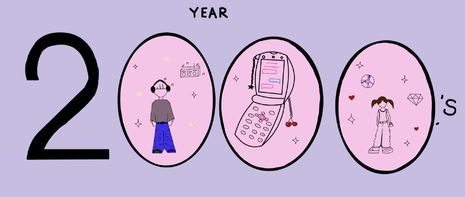Why-2K?
Lauren Bird explores the reasons for Gen Z’s obsession with 2000s culture

2023 was a year of nostalgia. Continuing a trend set during lockdown, style, film and music for the youth of today has all followed the same pattern - Y2K rules! Obfuscated by claw clips and chunky rings, low-rise and statement belts, Y2K’s entrenchment in Gen Z culture goes further than the aesthetics - our desire to go back in time signifies a deeper longing for a teenage-hood we never had. At the risk of sounding like *that* HSPS student, the reasoning behind the enduring popularity of 2000s culture amongst my generation certainly isn’t limited to its aesthetic value. If anything, it displays that the digitization and technological progression of the postmodern era we grew up in is not necessarily what we want, nor feel fulfilled by.
“Our desire to go back in time signifies a deeper longing for a teenage-hood we never had”
We may be the only teenagers so far able to order a taxi, takeaway, even drug deal, with a few taps of the fingers - but coming of age during the tech revolution comes with its downsides. Our teenage years came with all the natural and political disasters endemic to the modern world. But, for the first time, technology meant that information was with us constantly, parcelled into short-form, easy-to-consume media. As a result, the last decade has seen a world of definitions rapidly replaced by one where ‘information’ is an uncertain, fluid commodity. Meanwhile, we’re touted as the generation who can finally change things. But despite the digital world lying at our fingertips, our distant online vantage point to the world’s disasters makes our attempts to effect change seem insignificant, even futile.
Amidst this chaos, the Y2K trend has been a fairly consistent feature of Gen Z culture. Ignoring the endless Netflix docuseries on professional athletes, 2023’s TV and film offerings certainly saw an influx of 2000s-inspired settings and remakes. From the Hunger Games and Percy Jackson to Emerald Fennell’s Saltburn, which covers many Instagram explore pages with Jacob Elordi or Alison Oliver smoking cigarettes. (Unless that’s just mine). And in defiance of fast fashion, low-rise, retro trainers and chain belts still form part of the uniform seen on Sidgwick Site (the observance of which is certainly the most accurate method for judging what’s cool).
Alongside the obviously nostalgic aesthetic allure, Saltburn and other movies subtly reminded me of the ‘mystery’ of a teenage life not overseen at all points by a looming digital presence. With our every party, drunken one-night-stand and new haircut carefully curated and documented on our profiles, most of Gen Z’s youth didn’t experience teenage life without being surveilled constantly. Oliver Quick and his creation of a false self-image was reminiscent of our collective ‘second self’ in the form of our social media profiles, but also of our inability to be truly mysterious. How much more difficult, if not impossible, would his deception have been if it played out today?
“The digitization and technological progression of the postmodern era we grew up in is not necessarily what we want, nor feel fulfilled by”
It isn’t as though the 2000s themselves were a particularly stable time - recession, terror, and war remained omnipresent. However, from a childlike gaze, we saw it that way, and never suspected that the teenage life we saw from our highchairs would have changed dramatically by the time we reached that age. Sweaty teenage rebellion portrayed on Skins has been replaced by club events carefully sanitised and lit for Instagram feeds. Playing outside is a fond memory, confined to a blurry past where kids weren’t attached to devices tracking their every move. A past when school, work, and friends could be taken for granted, instead of things that have been taken away and can be again.
Maybe I’m exaggerating the significance of one psychological thriller, and our unending obsession with Y2K fashion trends. But it seems plausible that, having had everything that seemed permanent stripped away from us during the pandemic, as well as the threat of a world-changing climate crisis looming closer ahead, we would want to escape to a time when it all seemed more…manageable? Previously, facing a glowing box containing all the information in the world, and other people’s highlight reels, and the latest war or forest fire or recession or far-right politician in power was an impossibility. Now, it is simply ‘just checking my phone’.
And that is why the people crave rhinestone jeans and MGMT.
 News / Cambridge students set up encampment calling for Israel divestment6 May 2024
News / Cambridge students set up encampment calling for Israel divestment6 May 2024 News / Cambridge postgrad re-elected as City councillor4 May 2024
News / Cambridge postgrad re-elected as City councillor4 May 2024 News / Proposed changes to Cambridge exam resits remain stricter than most7 May 2024
News / Proposed changes to Cambridge exam resits remain stricter than most7 May 2024 News / Some supervisors’ effective pay rate £3 below living wage, new report finds5 May 2024
News / Some supervisors’ effective pay rate £3 below living wage, new report finds5 May 2024 Fashion / Class and closeted identities: how do fits fit into our cultures?6 May 2024
Fashion / Class and closeted identities: how do fits fit into our cultures?6 May 2024





